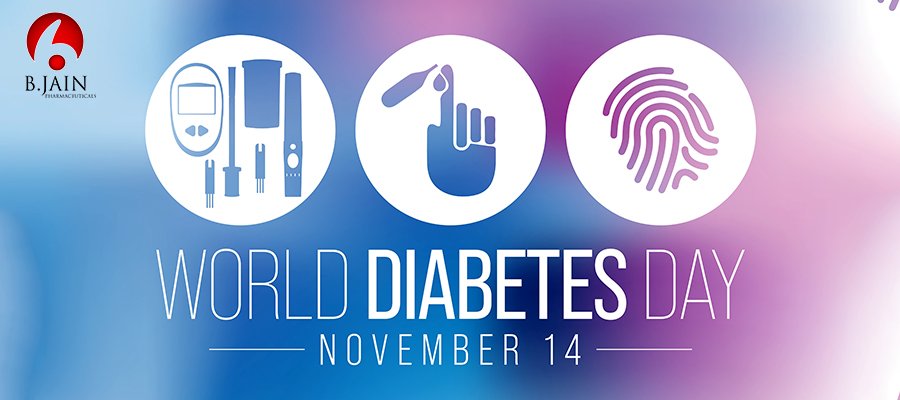Introduction
Every year on November 14th, the world unites to observe World Diabetes Day. This global awareness campaign serves as a reminder of the ever-increasing impact of diabetes on our society and the importance of prevention, early diagnosis, and effective management. With over 463 million people worldwide living with diabetes, and this number expected to rise, the need for awareness and action has never been greater. In this blog, we’ll explore the significance of World Diabetes Day and why it is crucial in the fight against this pervasive health condition.
The Global Diabetes Epidemic
Diabetes is a chronic medical condition characterized by elevated blood sugar levels resulting from the body’s inability to produce enough insulin (Type 1 diabetes) or effectively use the insulin it produces (Type 2 diabetes). The consequences of uncontrolled diabetes can be severe and even life-threatening. Complications include heart disease, stroke, kidney failure, blindness, and lower limb amputations.
The global diabetes epidemic is a pressing public health concern. According to the International Diabetes Federation (IDF), more than one in ten adults worldwide are living with diabetes, with approximately 232 million cases going undiagnosed. This epidemic is not limited to developed countries; low- and middle-income nations are seeing a significant increase in diabetes cases due to changing lifestyles, unhealthy diets, and a lack of access to healthcare.
Causes of Diabetes:
- Type 1 Diabetes: This is an autoimmune condition in which the immune system mistakenly attacks and destroys the insulin-producing beta cells in the pancreas. The exact cause of this autoimmune response is not well understood, but it is thought to involve genetic and environmental factors.
- Type 2 Diabetes: This form of diabetes is primarily associated with lifestyle and genetic factors. The following are common causes and risk factors:
- Insulin Resistance: Over time, the body’s cells become resistant to the effects of insulin, leading to higher blood sugar levels. This resistance is often associated with obesity, physical inactivity, and a diet high in refined sugars and unhealthy fats.
- Genetics: A family history of diabetes can increase the risk. Certain genes may also predispose individuals to Type 2 diabetes.
- Obesity: Excess body weight, especially around the abdomen, is a significant risk factor for Type 2 diabetes. Fat cells release substances that contribute to insulin resistance.
- Physical Inactivity: A sedentary lifestyle is associated with an increased risk of developing diabetes. Regular physical activity helps improve insulin sensitivity.
- Unhealthy Diet: Diets high in sugary beverages, processed foods, and low in fiber can contribute to diabetes risk. A diet rich in fruits, vegetables, whole grains, and lean proteins is recommended.
- Gestational Diabetes: Some women develop diabetes during pregnancy, known as gestational diabetes. While it usually goes away after childbirth, it increases the risk of developing Type 2 diabetes later in life.
Other Types of Diabetes: There are other, less common forms of diabetes, including:
- Gestational Diabetes: Occurs during pregnancy and typically resolves after childbirth, but it increases the risk of Type 2 diabetes.
- Monogenic Diabetes: Caused by a mutation in a single gene, leading to a specific form of diabetes that can be mistaken for Type 1 or Type 2.
- Secondary Diabetes: This results from another underlying medical condition, such as pancreatic disease or hormonal disorders.
- Environmental Factors: Some environmental factors, such as exposure to certain viruses or toxins, may contribute to the development of diabetes, but the role of these factors is not yet fully understood.
The Significance of World Diabetes Day
World Diabetes Day, established by the IDF and the World Health Organization (WHO) in 1991, serves several important purposes:
- Awareness: The day raises public awareness about diabetes, its risk factors, prevention, and the importance of early diagnosis. Many individuals are unaware of the signs and symptoms of diabetes, and World Diabetes Day seeks to change that.
- Advocacy: It provides a platform for advocacy, enabling organizations, healthcare professionals, and individuals to push for better diabetes care and management. Advocacy efforts help improve access to healthcare, medicines, and preventive measures.
- Education: World Diabetes Day promotes education and understanding of diabetes. By providing accurate information about the disease, its management, and prevention, individuals can make informed decisions about their health.
- Support: The day also offers support to individuals living with diabetes, their families, and communities. It reinforces the message that people with diabetes can lead fulfilling lives with proper care and management.
- Research: It encourages research and innovation to find new and improved treatments, preventive measures, and a potential cure for diabetes.
The Blue Circle: Symbol of Hope
The Blue Circle is the universal symbol of diabetes. It was introduced to represent the unity of the global diabetes community in response to the growing diabetes epidemic. Wearing a blue circle pin or using the symbol on social media during World Diabetes Day is a powerful way to show support and solidarity.
Homeopathic Medicines for Diabetes:
- Syzygium Jambolanum: This remedy is often recommended for excessive thirst and frequent urination, which are common symptoms of diabetes.
- Uranium Nitricum: It is suggested for diabetes with symptoms like excessive thirst, a tendency to eat frequently, and weakness.
- Phosphoric Acid: This remedy may be used for diabetes-related weakness, fatigue, and mental exhaustion.
- Lactic Acid: It could be considered for diabetes associated with muscle pain and weakness.
- Phosphorus: This remedy may be indicated for diabetes-related vision problems and neuropathy.
How Can You Get Involved?
- Raise awareness: Share information about diabetes on social media, using the hashtag #WorldDiabetesDay, and educate your friends and family about the importance of prevention and early diagnosis.
- Support organizations: Contribute to diabetes-related charities, research organizations, or local diabetes associations to help fund vital research, outreach, and support services.
- Get tested: If you’re at risk or exhibit diabetes symptoms, visit your healthcare provider for a blood sugar test. Early diagnosis and intervention can make a significant difference in managing the disease.
- Promote a healthy lifestyle: Encourage healthy eating, regular physical activity, and weight management in your community. Small changes in lifestyle can significantly reduce the risk of developing Type 2 diabetes.
Conclusion
World Diabetes Day is a vital global initiative that serves to raise awareness, promote education, and advocate for the millions of individuals affected by diabetes worldwide. The significance of this day lies not only in acknowledging the current diabetes epidemic but also in uniting people to fight against it.
While it’s crucial to recognize the importance of traditional medical treatments and lifestyle modifications in managing diabetes, complementary approaches like homeopathy can also play a role in supporting overall well-being. One such homeopathic product is Omeo Diabeteez Drops.
As we observe World Diabetes Day, let us continue to advocate for better diabetes care, increased awareness, and ongoing research into more effective treatments and prevention strategies. By combining the strengths of both conventional medicine and complementary approaches, we can work towards a world where diabetes is better understood, effectively managed, and, ultimately, one day conquered.

Dr Simranjit Kaur
Dr Simranjit Kaur is a highly accomplished medical professional with a BHMS degree from BVDU Pune and additional qualifications including CGO and MBA(Hospital Administration). With a passion for paediatric care, Dr. Simranjit pursed a fellowship in paediatrics, honing expertise in the specialized field. Currently Research Officer at BJain Pharmaceuticals.



